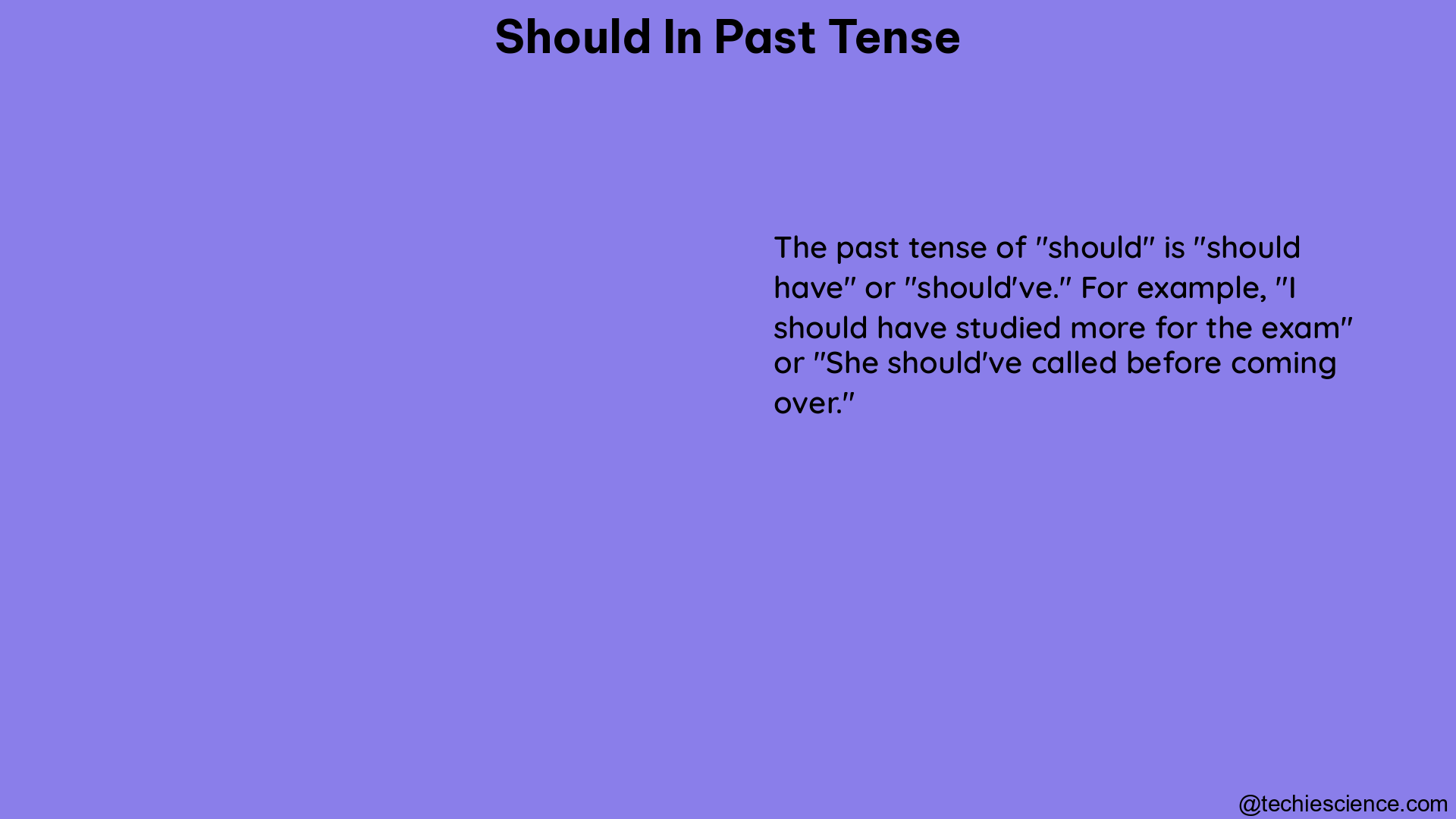The past tense of “should” is a complex and nuanced topic in English grammar. Understanding its proper usage is crucial for effective communication, whether in formal writing or casual conversation. In this comprehensive guide, we will delve into the intricacies of the past tense of “should,” providing you with a thorough understanding of its various applications and examples.
Understanding the Past Tense of “Should”
- “Should Have” + Past Participle: This construction is used to express regret, missed opportunities, or actions that were ideal in the past but did not occur. It implies that the situation cannot be changed now.
- Example: “She should have studied harder for the exam.” (Expresses regret that she did not study harder)
-
Example: “I suggested that he should have applied for the job.” (Implies that it is too late for him to apply now)
-
“Should” in the Past Tense to Express Opinion or Advice: In this case, “should” does not change form and is used in the same way as in the present tense, but it refers to the speaker’s opinion or advice at a specific time in the past.
- Example: “I said she should buy a car.” (Expresses the speaker’s opinion at the time)
- Example: “She knew that she should quit smoking.” (Expresses the speaker’s advice at the time)
Asking for Advice or Expressing Regret in the Past

The past tense of “should” can also be used in questions to ask for advice or express regret about past actions.
- Asking for Advice about a Past Situation:
-
Example: “What should I have done differently?”
-
Expressing Regret about a Past Decision:
- Example: “Where should we have gone?”
Informal Contractions of “Should”
In casual speech, “should” can be contracted to “should’ve” or “shoulda” to create a more informal and conversational tone.
– Example: “I should’ve studied harder.” (Informal way of saying “I should have studied harder”)
– Example: “We shoulda gone to the store.” (Informal way of saying “We should have gone to the store”)
Grammatical Considerations
- Verb Tense Consistency: When using the past tense of “should,” it is important to maintain consistency with the overall verb tense in the sentence. The past tense of “should” should be used in conjunction with other past tense verbs or constructions.
- Example: “She said she should have applied for the job.” (Consistent use of past tense)
-
Example: “She says she should have applied for the job.” (Inconsistent use of present and past tense)
-
Passive Voice: The past tense of “should” can also be used in passive voice constructions to emphasize the action rather than the subject.
- Example: “The report should have been submitted by the deadline.” (Passive voice)
-
Example: “They should have submitted the report by the deadline.” (Active voice)
-
Negation: The past tense of “should” can be negated to express the opposite of what was expected or advised.
- Example: “She should not have missed the meeting.” (Expresses regret that she missed the meeting)
-
Example: “They should not have gone on vacation during the busy season.” (Expresses regret about their decision to go on vacation)
-
Modal Verbs: The past tense of “should” can be combined with other modal verbs, such as “could” or “might,” to express more complex ideas about past events.
- Example: “She should have been able to complete the project on time.” (Expresses regret that she was unable to complete the project on time)
- Example: “They should have might have won the game if they had practiced more.” (Expresses uncertainty about the past outcome)
Practical Examples and Usage
Here are some additional examples to illustrate the various uses of the past tense of “should”:
- Expressing Regret:
- “I should have listened to my parents’ advice about choosing a career path.”
-
“The team should have won the championship, but they made too many mistakes in the final game.”
-
Giving Advice in the Past:
- “The teacher said the students should have started their research earlier for the project.”
-
“My friend told me I should have taken a different route to avoid the traffic.”
-
Asking for Advice about a Past Situation:
- “What should I have done differently to improve my performance at the interview?”
-
“Where should we have gone for our vacation to have a more enjoyable experience?”
-
Informal Contractions:
- “I should’ve studied harder for the exam, but I got distracted by social media.”
- “We shoulda booked our hotel room earlier, but we didn’t realize how popular the destination was.”
By understanding the nuances of the past tense of “should,” you can effectively communicate your thoughts, regrets, and advice about past events, both in formal and informal settings. Remember to pay attention to verb tense consistency, passive voice constructions, negation, and the combination of “should” with other modal verbs to ensure your usage is accurate and clear.
Reference:
- https://ell.stackexchange.com/questions/257910/past-tense-of-should
- https://www.butte.edu/departments/cas/tipsheets/grammar/would.html
- https://www.engvid.com/grammar-past-tense-should/
Hey! I am Arpita Bose Roy. My qualifications are M.A. in English with B. Ed. in both general education and special education. I have 2 years of experience as a “language analyst” at IIT Kharagpur and 4 years of experience as an “Academic Content Developer” at IIT Kharagpur. Currently, I am working as an academic writer at Lambdageeks.